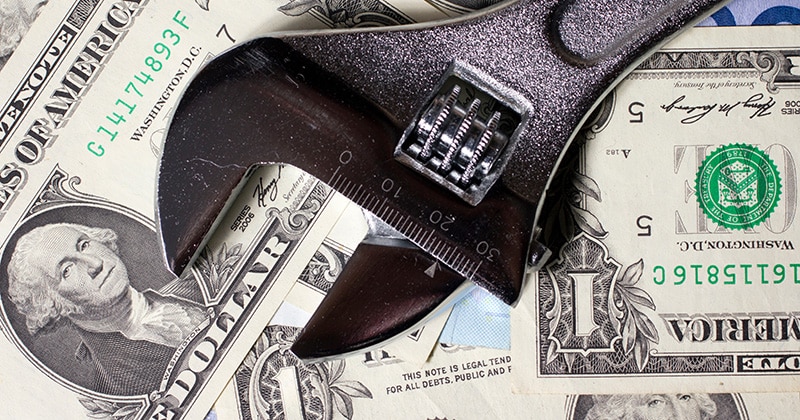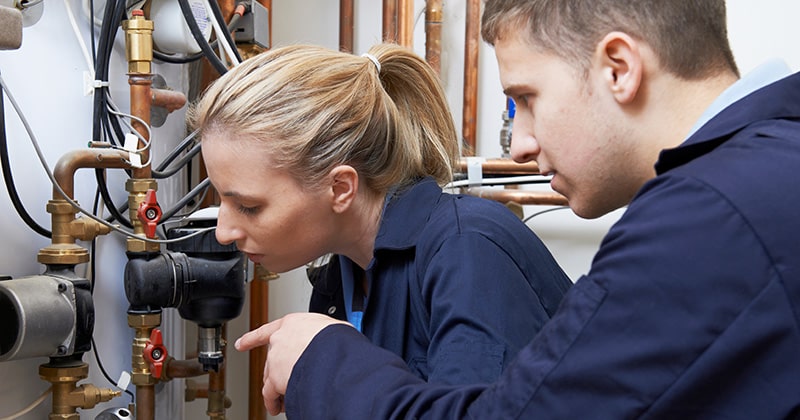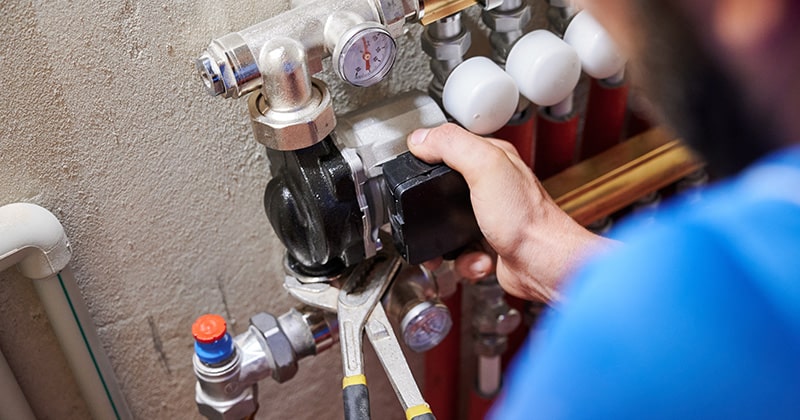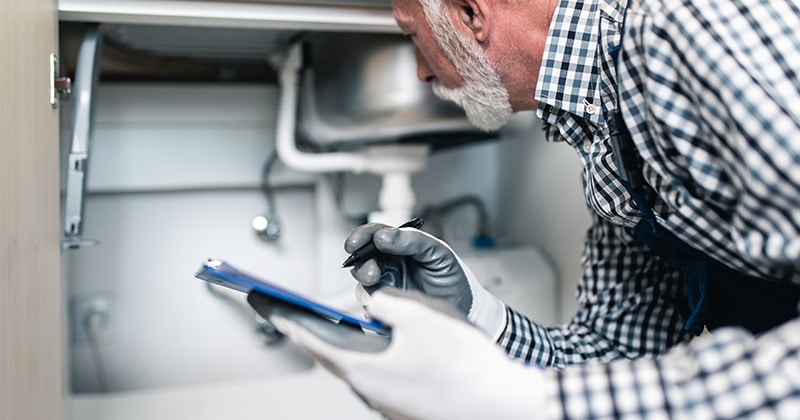
Thinking of becoming a licensed plumber? Why not go for it?
For one, plumbing is an in-demand profession. Homes, businesses, and industries can’t do without plumbing. That guarantees job security.
Two, plumbing is a pretty lucrative gig. Over 430,000 people in the US earn a decent paycheck from plumbing.
What does a plumber make? That’s probably the most pressing question on your mind.
Well, this article will help you find an answer. For starters, we’ll look at the national average salaries for plumbers. We’ll also discuss how certification, training, and specialization could influence your earning capacity.
Is a career in plumbing really worth it?
Read on to find out. (Spoiler alert: a plumbing career is totally worth it.)
RELATED ARTICLE: How to Become a Licensed Plumber

National Salary Averages for Plumbers
Let’s start with the national average salary for plumbers.
Here’s the latest from the US Bureau of Labor Statistics (BLS):
Plumbers in the US earn, on average, $67,840 annually. That amounts to a $32.62 mean hourly wage. However, some plumbers earn less or more than the national average. A plumber’s hourly rate ranges from $18.6 to $49.59.
Naturally, these figures vary depending on who you ask.
ZipRecruiter, for example, puts the average hourly rate for plumbers at $30.39. According to ZipRecruiter, most plumbers make between $23.80 and $34.86 an hour. But these rates can go as high as $48.08 or as low as $14.18.
That’s not too far off from BLS’s estimates. But why such a wide range of possible earning rates?
To put it simply, not all plumbers are equal. How much you earn as a plumber will depend on these five factors:
Expertise
The higher your plumbing skill level, the more you’ll earn. That’s true for any skill-dependent profession.
Plumbers generally have three skill levels: apprentice, journeyman, and master plumber.
You’ll earn the least (around $41,000 annually) as an apprentice learning the trade. And as your skills grow, so will your paycheck. The average salary for master plumbers in the US is $80,053 per year.
Level of experience
Experience matters greatly in the tradesperson business—so much so that it dictates wages. Like in other hands-on trades, a plumber with years of experience is more valuable than a recruit.
As a newbie, you’ll likely earn entry-level wages.
Specialization
Most people picture faucets, showers, and toilets when they hear “plumbing.” However, plumbing is a much broader professional field. In fact, indoor plumbing is only a small part of what plumbers do.
For instance, you can become a residential, commercial, water supply, sanitation, or construction plumber. You could even work as a plumbing engineer or designer. Remember that some areas of specialization may be more rewarding than others. (More on this below.)
Location
Your location may also determine your earnings as a plumber. The demand-to-supply ratio for plumbing services varies between towns, cities, and even states.
Here’s an example of the astonishing difference in plumber earnings between two states:
Research by Zippia ranks Oregon as having the highest plumber salary, at $86,677 per year. Florida is on the other end of the spectrum. Plumbers in Florida take home an average annual salary of $37,879.
That’s a whopping $48,798 difference in yearly wages for the same profession.
Knowing this, would you be willing to move states to make more money as a plumber? That’s something worth considering.
Employment
Plumbers have two main career options. You could work either as an employee for a plumbing company or as an independent plumbing contractor. Both routes have their perks and limitations.
As an employed plumber, there’s not much you can do about your salary. However, looking on the bright side, employment gives you a stable livelihood, which may come with other benefits too.
On the other hand, you’ll likely earn more as your own boss. For example, Mr. Rooter Plumbing bagged millions in annual revenue. But that comes with the inherent risks and challenges of running a contracting business.
RELATED ARTICLE: How to Grow & Run a Successful Plumbing Business

How Training and Certificates Impact Earnings
There’s more to plumbing than fixing leaky faucets and unclogging blocked drains. It’s a highly demanding and skill-intensive profession.
You must possess all the necessary certifications and licenses to succeed as a plumber. These prove you have the specialized knowledge for the job.
Plus, the more qualified and competent you are, the more you’ll earn.
Here are five plumber certificates that will boost your income:
Trade School Diploma
Some aspiring plumbers immediately pursue an apprenticeship. However, attending trade school is crucial to becoming a licensed plumber. A plumbing certificate or diploma program provides essential formal training before an apprenticeship.
Trade schools also provide a structured approach to learning the trade and hands-on experience. Vocational training institutes like Fort Myers Technical College offer excellent vocational plumbing courses.
An entire plumbing course typically runs for eight to 10 months, either full-time or part-time. You’ll be awarded a diploma or certificate after completing the course and passing a final exam.
Journeyman Plumber License
After completing plumber training, you’ll start work as an apprentice. Plumber apprenticeships typically last between two to five years (depending on your state’s requirements).
During the apprenticeship, a more experienced plumber supervises your work. You also learn a lot of practical skills on the job.
Once you’ve completed your apprenticeship, you can apply for a journeyman plumber license.
The application’s processes and requirements vary widely from state to state. The general requirements include:
- Proving you’ve completed your apprenticeship
- Paying an application fee
- Attending a brief training program
- Passing an exam
- Providing employment and tax documents
Leveling up to journeyman plumber comes with a significant pay raise. A journeyman plumber makes, on average, $34 an hour. That’s about 40% more than you’d earn as an apprentice.
Master Plumber License
Master plumber is the highest level of profession in plumbing. As a master plumber, you can supervise and perform plumbing activities. You can also choose to specialize in one or more areas of plumbing, such as pipefitting, steam fitting, or pipelaying.
Best of all, master plumbers earn nearly $40 in hourly wages.
Again, the requirements for a master plumber license will depend on your state. Most states require that you previously held a journeyman plumber position for a few years. You must also pass a master plumber exam and pay licensure fees.
Certified in Plumbing Design (CPD)
CPD is an international certification program the American Society of Plumbing Engineers (ASPE) offers. The program includes training, examination, and plumbing engineering and design certification.
Don’t let the word “engineering” scare you.
You don’t have to be a state-licensed engineer to take the CPD. However, you do need a degree in mechanical or professional engineering and at least four years of experience in designing plumbing systems, among other requirements.
Acquiring an ASPE certificate in plumbing design is a big deal. It advances your professional skills and adds value to your resume. And that comes with hefty rewards. Certified plumbing engineers and designers are the highest earners in the industry. You could even make a six-figure annual salary with a CPD certification.
Continuing Education (CE) Courses for Plumbers
CE courses are great for keeping up with the latest plumbing trends. You can also take a CE course to improve on specific plumbing skills. These are short courses spanning just a few days or weeks—some you can even take online. What do CE courses for plumbers entail? Well, they offer a broad spectrum of vocational training. In most cases, they involve skills and knowledge that wouldn’t otherwise fit in more structured plumber training programs. Check out this list of ASPE-approved CE courses Watts offers to give you an idea of what to expect. You learn something new in each program. That, of course, boosts your professional value as a plumber.

Plumbing Specialties You Can Pursue
What type of plumber do you want to be?
Plumbing is a broad field with several areas of specialization. While the fundamentals remain the same throughout the industry, your specialization dictates your service scope and responsibilities.
Your specialization will also determine your earning capacity.
Here are six specialties you can pursue in the plumbing industry:
A residential plumber specializes in home plumbing systems. You’ll work directly with homeowners, property managers, and landlords to ensure proper water flow, gas flow, and drainage in residential homes.
Your responsibilities as a residential plumber may include:
- Installing plumbing systems in new houses and home remodels
- Repairing and servicing home plumbing systems
- Installing water and gas lines
- Diagnosing and fixing plumbing issues in residential buildings
Residential plumbers typically earn an average plumber’s wage.
Commercial Plumber
Commercial plumbers work on plumbing systems in commercial buildings, such as malls, schools, hospitals, and office blocks.
Commercial plumbing jobs are much more demanding than residential plumbing jobs. This is because plumbing systems in commercial settings are larger and more complex than those in homes.
The plumber must also adhere to strict building codes, quality standards, and permit requirements. Plus, they should possess specialized skills to perform commercial plumbing jobs, such as:
- Reading blueprints
- Interpreting technical drawings
- Working with industrial-grade equipment
- Understanding complex piping layouts
- Handling high-pressure water supplies
The tougher job should be more rewarding, right?
You’d expect to earn more as a commercial plumber, but that’s not always true. Many job boards report higher salaries for residential plumbers instead.
However, commercial plumbers have more pay opportunities than residential plumbers. Commercial plumbers often work more and earn more at the end of the day.
FROM ONE OF OUR PARTNERS: Commercial Plumbing vs. Residential Plumbing
Service and Repair Plumber
A service and repair plumber specializes in troubleshooting and fixing plumbing systems. They work in both commercial and residential settings.
The job requires strong problem-solving skills and the know-how to repair various plumbing systems.
As a service and repair plumber, you’ll likely work on-call shifts. It’ll be your job to respond to plumbing emergencies. So, you might work odd hours fixing broken plumbing systems.
A service plumber earns about average pay.
Construction Plumber
Construction plumbers install plumbing systems in new commercial and residential buildings. They can also work on remodeling jobs. A construction plumber is responsible for:
- Planning pipe layouts
- Installing new pipes and drainage systems
- Shutting off inlet valves at construction sites
- Testing new plumbing installations
- Ensuring new plumbing systems are up to code
Sanitary Plumber
A sanitary plumber deals exclusively with plumbing systems related to sanitation. These are your bathroom pipes, drains, overflows, soil pipes, and sewer links. Their main job is to ensure the safe and clean disposal of wastewater.
Sanitary plumbing is a relatively niche specialty. You’ll likely find work in sanitation companies as a sewer and drain technician. On average, the role pays $27 an hour.
Plumbing Design Engineer
A plumbing design engineer plans, designs, and creates plumbing systems. They do big-picture stuff and rarely involve themselves in the day-to-day plumbing activities.
As a plumbing designer, you’ll spend most of your time on CAD software visualizing, simulating, and testing plumbing systems. You’ll also collaborate with contractors, architects, and local government agencies in planning things like sewer networks, pipe layouts, and sprinkler systems.
The role draws from principles in mechanical, architectural, and civil engineering. It’s a skill-intensive field that requires extensive professional training and experience, which explains why it is the highest-paying job in the plumbing industry.

Forecast for the Plumbing Industry
Are you worried about job security in the plumbing industry?
Well, you can put those worries to rest. The plumbing industry has a strong labor market.
The first indication of this is the thriving plumbing market. The US plumbing market was worth $126.4 billion in 2023. Although stats show a slight market decline, employment and startup rates in the plumbing industry are increasing.
Second, the country needs more plumbers.
There’s a worrying shortage of skilled plumbers. Analysts report that the US could be short of 550,000 plumbers by 2027. That’s good news for any contractor aspiring to become a plumber.
FROM ONE OF OUR PARTNERS: Avoid Leaving Money on the Table: How Plumbers Can Ensure They Maximize Profitability on Every Job
Assessing the Career Viability: Where to Start
- Enroll in trade school for plumber training.
- Gauge the demand for plumbing professionals in your local labor market.
- Choose an in-demand and lucrative plumbing specialty.
- Weigh the merits of employment vs. working as an independent plumber.
- Keep learning and upskilling to grow your professional value.
Related Posts
How to Market a Painting Business
Continue Reading8 Types of Cleaning Services to Specialize In
Continue ReadingStay Informed
Get the latest news and insights plus, Service Fusion offers and updates.Thank you for your submission.

SHARE